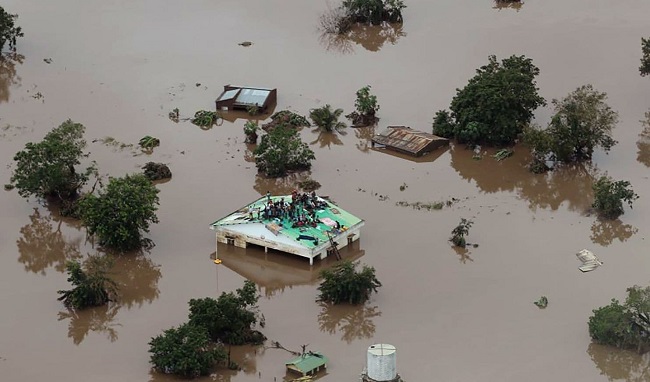Cyclone Idai that left 1.85 million people in need of assistance in Mozambique is a catastrophe that UN Chief, Antonio Guterres, said on Tuesday, Monday 26, 2019 rang “yet another alarm bell about the dangers of climate change.”

Guterres described Idai, which flattened homes and caused massive flooding after slamming into Mozambique near the port of Beira on March 14, as “an uncommonly fierce and prolonged storm.”
The cyclone ripped through neighbouring Zimbabwe and Malawi, killing at least 686 people across the three southern African countries.
In hardest-hit Mozambique, tens of thousands of homes were destroyed and hundreds of thousands of people were displaced across an area of some 3,000 square km (1,200 square miles) – roughly the size of Luxembourg.
“At least one million children need urgent assistance and this number may well grow.
“We fear that whole villages have been washed away in places we have yet to reach,” Secretary-General Guterres said at the UN.
There were reports that $1 billion worth of infrastructure had been destroyed, he added.
While scientists say single weather events cannot be attributed to climate change, they say global warming is causing more extreme rainfall and storms, sweltering heatwaves, shrinking harvests and worsening water shortages around the world.
Receding flood waters in Mozambique have allowed greater access, and a greater sense of how much people have lost.
Thousands of people, stranded for more than a week by the flooding, are now being moved to safer shelters.
“We’re now going out on the ground, dropping people off from helicopters to determine what the critical needs are,” said Sebastian Rhodes Stampa, Coordinator in the UN Office for the Coordination of Humanitarian Affairs.
The relief focus has increasingly turned to preventing or containing what many believe will be inevitable outbreaks of malaria and cholera.
No cholera cases have yet been confirmed, but health workers have reported an upsurge in cases of diarrhea – a symptom of the disease.
“We are testing as we go,” said Rob Holden, WHO incident manager in the capital Maputo.
“But nonetheless we are treating acute watery diarrhea, it’s the same as treating cholera. That’s just the diagnosis.”
Dozens of people queued in front of a clinic in Beira’s Munhava district on Tuesday, as nurses wearing surgical masks handed out a chlorine solution to prevent the spread of diseases.
“There is a big population, dense population in Beira,” said Gert Verdonck, Emergency Coordinator for Medecins Sans Frontieres (MSF).
“Of course, any spread of any kind of epidemic will be a lot quicker here.”
The WHO is dispatching 900,000 doses of oral cholera vaccine from a global stockpile.
The shipment is expected to arrive within 10 days, and a first round of vaccinations will target 100,000 people.
Cholera is spread by faeces in sewage-contaminated water or food, and outbreaks can develop quickly in a humanitarian crisis where sanitation systems are disrupted.
It can kill within hours if left untreated.
The UN World Food Programme (WFP) has designated Mozambique a level three emergency, placing it on a par with Syria, Yemen and South Sudan.
The agency is preparing to feed 1.7 million people in Mozambique, which has a population of around 30 million.
The UN is appealing for $282 million to fund the first three months of the disaster response in Mozambique, and a total of $337 million.
So far, only two per cent of that amount has been funded.
The International Monetary Fund (IMF) said on Tuesday it would consider emergency financial assistance in Mozambique under an IMF Rapid Credit Facility.
While it was still early to precisely assess the cyclone’s macroeconomic effects and reconstruction costs, “these will be very significant”, the IMF said in a statement.
Mozambique admitted in 2016 to $1.4 billion of previously undisclosed loans, prompting the IMF to cut off support and triggering a currency collapse and debt default. The WFP said it will aim to distribute food assistance to 732,000 people in Malawi and 270,000 in Zimbabwe.
